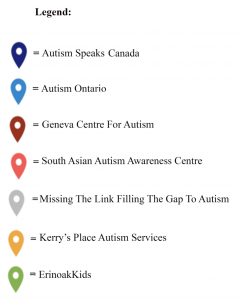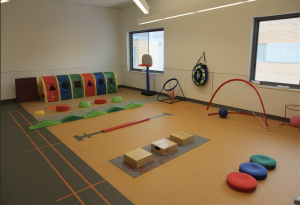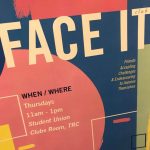BY CORY MORRISON
Services for people with Autism Spectrum Disorder are crucial to helping them overcome their challenges. Martin Gallagher, a Sheridan student with Autism Spectrum Disorder, and counsellors Suzyo Suman Bavi and Janice Galloway, who work with a club at Sheridan known as FACEIT, share their thoughts on how autism awareness and services have improved over the years and what still needs to be done.
What is Autism Spectrum Disorder
Autism Spectrum Disorder is a neurological developmental disorder characterized by difficulties with:
- Fine motor skills
- Gross motor skills
- Intense and often short-lived fascinations with unusual topics.
- Making and keeping friendships as well as relationships.
- Non-verbal communication skills (Body language, eye contact, facial expressions, gestures)
- Repetitive behaviours
- Sensory issues (Sensitivity to light, smell, sound, taste, touch)
- Social interactions
- Speech skills
The high end of the autism spectrum was previously known as Asperger’s Syndrome until it was removed from the diagnostic criteria in 2013. All of the previous autism spectrum diagnoses are now put into a single diagnosis known as Autism Spectrum Disorder (ASD).
A timeline shows the history of the autism spectrum.
Timeline by Cory Morrison/Sheridan Sun.
A report called Autism Spectrum Disorder Among Children and Youth in Canada was published by the Public Health Agency of Canada in March. Here are some findings.
Infographic by Cory Morrison/Sheridan Sun.
Autism services and how they have improved
Martin Gallagher, a student at Sheridan with Autism Spectrum Disorder, explains what it is like for him to live with the disorder.
Videos by Cory Morrison/Sheridan Sun.
“It’s challenging finding balance between fixating and not caring at all, but I feel here at Sheridan with the resources we have, I can find that balance very easily and I can find people who are like me,” he said.
The Golden Horseshoe has many services available for families impacted by Autism Spectrum Disorder to help with challenges.
This map shows the facilities which provide services to families impacted by Autism Spectrum Disorder.

Map and legend by Cory Morrison/Sheridan Sun.

Photos by Cory Morrison/Sheridan Sun.
Suzyo Suman Bavi, a counsellor at Sheridan College, explains how services have improved over the years.
Bavi is especially pleased with the campaigns on autism awareness as well as the organizations that offer job opportunities to students with disabilities, including Autism Spectrum Disorder.
“We do have a couple of organizations that have come on campus here, trying to offer job opportunities, so I think that is a step in the right direction,” he said.
Bavi is also pleased with how more students with Autism Spectrum Disorder have been entering post-secondary institutions in recent years.
“In terms of higher learning institutions, we are seeing more students coming to college. If you ask me ten years ago or so, we didn’t see as many students on the spectrum,” he said. “It is really encouraging to see that students on the spectrum have a place where they can come and feel empowered and actually just be themselves.”

FACEIT club
Gallagher and Bavi take part in a club at Sheridan specifically for people with Autism Spectrum Disorder, known as the FACEIT club. Gallagher is going to become the student president of the club for the 2018-2019 school year. Bavi assists Janice Galloway, a counsellor who currently runs the club.
Galloway explains what the club is and how it helps people with Autism Spectrum Disorder .
“It’s a club where students are able to themselves. They find themselves in a safe space and can be there together working on skills that they may find challenging,” she said. “It is run by Accessible Learning.”
Galloway adds that many students with Autism Spectrum Disorder feel isolated when they first enter Sheridan, and the group has helped them overcome this challenge.
“Finding the club has helped them come out and identify themselves and promote understanding and acceptance of students on the autism spectrum here at Sheridan, and that is a huge positive impact that has lead our community here at Sheridan to that understanding,” she said.
What can still be improved with autism services
Gallagher, Bavi, and Galloway feel that there is still room for improvement when it comes to autism services, particularly in terms of helping employers, teachers, and the general population on how to support people with Autism Spectrum Disorder.
Gallagher feels that when it comes to invisible disabilities, many people do not understand how to properly respond to these people. He hopes that in the future, people will learn about Autism Spectrum Disorder at a young age in school so they can better understand people with Autism Spectrum Disorder in the video below.
“I think some services that would be great would be just having universal knowledge of it,” he said. “They should start implementing this at school like how they started implementing better sex ed, they should start implementing better conversations about what is autism and other invisible disabilities.”
One of Bavi’s concerns is how post-secondary faculty may not always understand Autism Spectrum Disorder, as he explains in the video below.
“Sometimes, they don’t know what to do when they see certain behaviours and how to respond and how to support the students,” he said. “I think there is a gap where we need to purposely educate and equip faculty on how they can support students on the spectrum.”
One of Galloway’s concerns is how difficult finding employment can be for people with Autism Spectrum Disorder because of their difficulties with interviewing skills when it comes to eye contact, as she explains in the video below.
“A lot of interviewing is part of eye contact,” she said. “I know a lot of what I’ve heard is students get told ‘You’re not looking me in the eye’ and people find that becomes that barrier to the interview because people who are interviewing them may not understand that this is just something that is not what they are intentionally doing.”
For more information on Autism Spectrum Disorder and its services, visit:
ErinoakKids Centre for Treatment and Development
Missing Links Filling the Gaps to Autism
South Asian Autism Awareness Centre
Facebook links
ErinoakKids Centre for Treatment and Development
Missing Links Filling the Gaps to Autism
South Asian Autism Awareness Centre
Instagram links
ErinoakKids Centre for Treatment and Development
Missing Links to Filling the Gaps to Autism
South Asian Autism Awareness Centre
Twitter links
